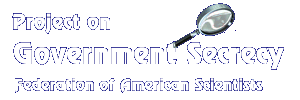 FAS |
Secrecy | 2002 News ||
Index |
Search |
Join FAS
FAS |
Secrecy | 2002 News ||
Index |
Search |
Join FAS

 |
|
|

Secrecy and Security News
Newer News: December 2002
November 2002
- Bush Approves Sept. 11 Probe Led by Kissinger, by Adam Entous, Reuters, November 27. "'Kissinger is not distinguished as an impartial judge of government misconduct, to put it mildly. To the contrary, he is an investigatee, not an investigator, and one who has stubbornly resisted the disclosure of official information to members of Congress, courts of law, private researchers, and others,' said Steven Aftergood, a government secrecy expert at the Federation of American Scientists."
- Statement of the President on the Homeland Security Act, signing statement, November 25. "I will determine which elements of the Department of Homeland Security are concerned with the analysis of foreign intelligence information."
- Sen. Chuck Grassley Request IG Review of the Total Information Awareness Program, press release, November 22. "I would ask that your office conduct a complete and thorough review of the TIA program."
- Legislation Gives Government Right to Secrecy, by James Kuhnhenn and Drew Brown, Knight Ridder Newspapers, November 21. "Nothing more starkly illustrates the federal government's post-Sept. 11 desire to learn more about its citizens and to divulge less about itself than the new homeland security legislation."
- UnderSecretary of Defense Aldridge on DARPA's Total Information Awareness program, Pentagon press briefing, November 20. "The war on terror and the tracking of potential terrorists and terrorist acts require that we search for clues of such activities in a mass of data."
- Homeland Security Bill's Secrecy Provisions Stick, by Bill Matthews, Federal Computer Week, November 19. "Exempting 'information' from disclosure puts much more material off limits to the public than exempting 'records'."
- Secretary Rumsfeld on DARPA's Total Information Awareness program, press availability, November 18. "Nothing terrible is going to happen."
- Homeland Security Bill's Secrecy Rules Criticized, by Tamara Lytle, Orlando Sentinel, November 15. "The secrecy rules would allow companies to shield information they offer the government from disclosure to the public. Freedom-of-information advocates say that might make the nation's homeland less secure by letting companies hide their failures to protect their facilities from health and safety risks."
- Military Aid in D.C. Sniper Pursuit May Have Broken Law, by Elaine M. Grossman, Inside the Pentagon, November 14. "A longtime expert in military jurisprudence contends Defense Secretary Donald Rumsfeld likely violated the law last month when he directed U.S. Northern Command -- the military headquarters for homeland defense -- to help track down the Washington area snipers."
- Images from the Cold War: U.S. releases spy satellite photos, by Leonard David, Space.com, November 14. "Thousands of formerly classified satellite pictures taken around the planet are becoming available to browse at public leisure."
- New federal policy may restrict research access, by Jonathan York, Daily Texan, November 11. "U.S. federal policy traditionally recognizes 'classified' and 'unclassified' information, but a new, vaguely defined category may be emerging. This label would designate some data 'sensitive but unclassified'."
- Experts: Yemen strike not assassination, by Pamela Hess, United Press International, November 8. "The Hellfire missile strike launched by a CIA-operated drone that killed a top al Qaida militant and five others in a car in Yemen on Sunday may not have violated the U.S. ban on assassinations, but the Bush administration's new rules on America's right to self-defense in the uncertain battlefield of the war on terrorism need to be sharply defined, according to former intelligence officials and experts."
- CIA Dismisses Hanssen Book After Author Blows Cover, by Tabassum Zakaria, Reuters, November 8. "Aftergood said the author's contention that the CIA tried to censor the book did not hold up."
- U.S.-Yemen relationship in spotlight, by Robert Collier, San Francisco Chronicle, November 6. "As the U.S. missile attack that killed six al Qaeda terror suspects in Yemen reverberated around the globe Tuesday, there were more questions than answers in the air."
- 'P2OG' allows Pentagon to fight dirty, by David Isenberg, Asia Times, November 5. "It would be the largest expansion into the world of black ops and covert action since the end of the Vietnam War in the 1970s."
- White House proposes security information rules, by Jeff Nesmith, Atlanta Journal-Constitution, November 1. "The White House is drafting guidelines to define a new category of government information that would be withheld from the public to avoid making it available to terrorists."
- Blinken: Craig remark flouts law by Rusty Barker, Idaho Statesman, November 1. "If Sen. Craig has given out information or intimations from a secret briefing, that is a violation of the law, that is a felony," said Democratic Senate candidate Alan Blinken.
Older News: October 2002
 FAS |
Secrecy |
2002 News ||
Index |
Search |
Join FAS
FAS |
Secrecy |
2002 News ||
Index |
Search |
Join FAS
 http://www.fas.org/sgp/news/2002/11/index.html
http://www.fas.org/sgp/news/2002/11/index.html
 Maintained by Steven Aftergood
Maintained by Steven Aftergood



